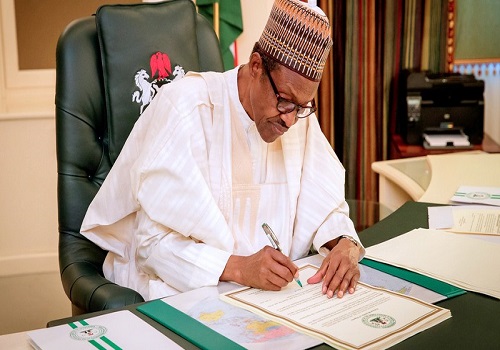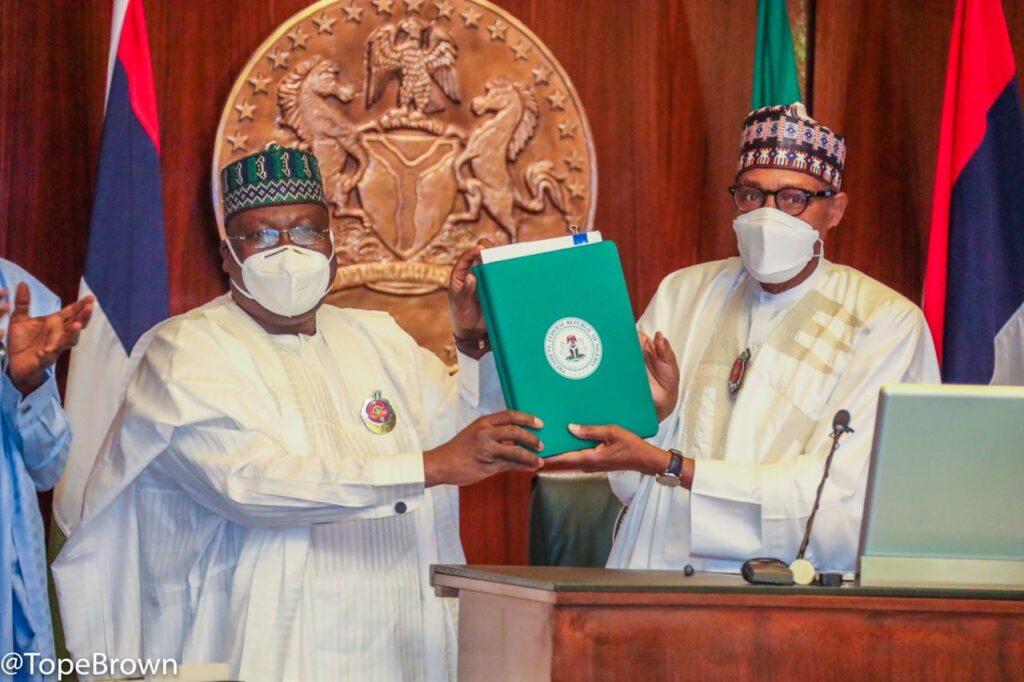National
Buhari assents to N17.127Trillion budget in company of Lawan, Gbajabiamila
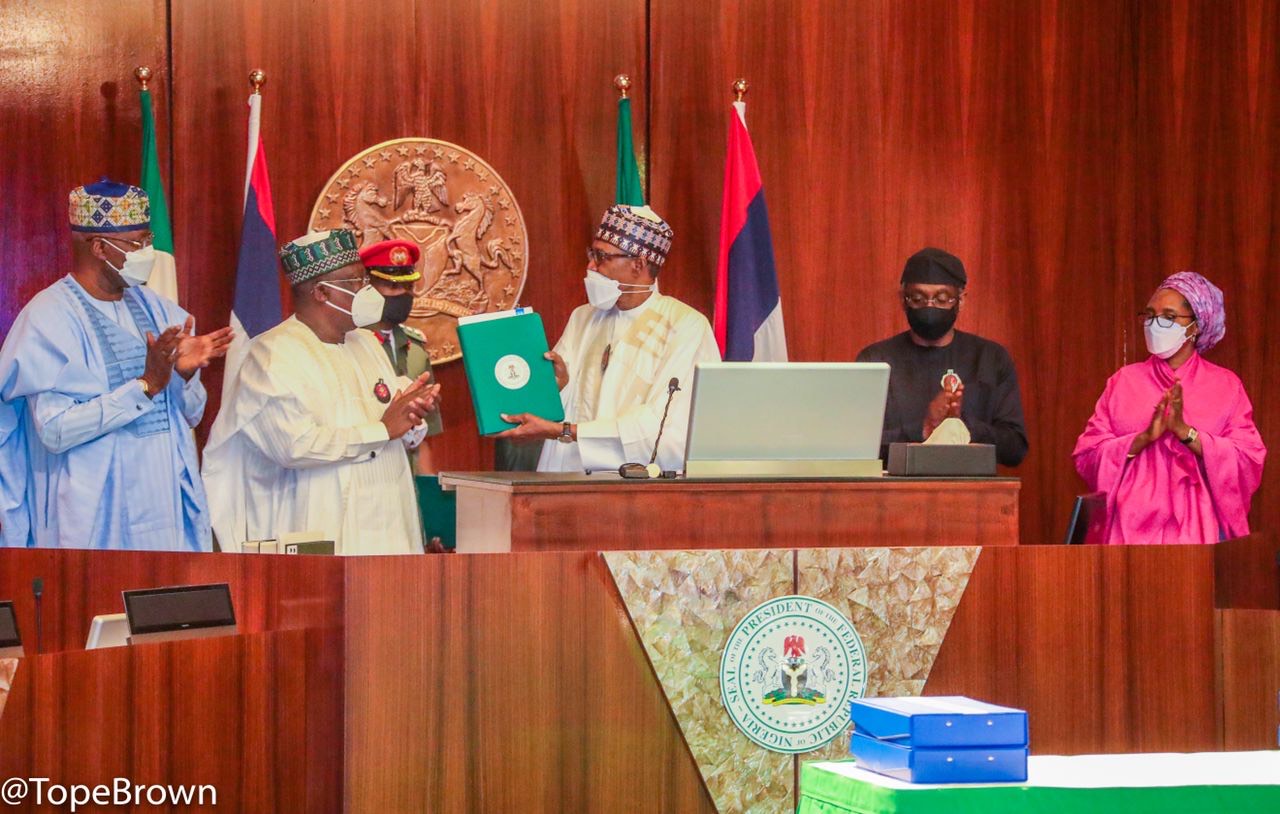
President Muhammadu Buhari on Friday in Abuja signed into law the 2022 Appropriation Bill and the 2021 Finance Bill.
The President signed the documents in the Presidential Villa in the presence of Senate President Ahmed Lawan, Speaker of the House of Representatives, Femi Gbajabiamila, and other members of the Federal Executive Council.
The President’s is in keeping with the tradition of restoring a predictable January to December fiscal year, as provided for in the Constitution of the Federal Republic of Nigeria,
Speaking at the event, the President said the 2022 Budget, just signed into law, provides for aggregate expenditures of N17.127 trillion, an increase of N735.85 billion over the initial Executive Proposal for a total expenditure of N16.391 trillion.
The President explained that N186.53 billion of the increase however came from additional critical expenditures that he had authorized the Minister of Finance, Budget and National Planning to forward to the National Assembly.
‘‘The Minister will provide the public with the details of the budget as passed by the National Assembly, and signed into law by me,’’ he said.
The President announced that as the 2023 Budget is going to be a transition budget, work will start in earnest to ensure early submission of the 2023-2025 Medium-Term Expenditure Framework and Fiscal Strategy Paper as well as the 2023 Appropriation Bill to the National Assembly.
He, therefore, directed Heads of Ministries, Departments and Agencies (MDAs) to cooperate with the Ministry of Finance, Budget and National Planning, more specifically with the Budget Office of the Federation, to realise this very important objective.
President Buhari also expressed strong reservations on the ‘‘worrisome changes’’ made by the National Assembly to the 2022 Executive Budget proposal.
He announced that he would revert to the National Assembly with a request for amendment as soon as the Assembly resumes to ensure that critical ongoing projects cardinal to this administration do not suffer a setback due to reduced funding.
The President recounted that during the presentation of the 2022 Appropriation Bill, he had stated that the fiscal year 2022 would be very crucial in his administration’s efforts to complete and put to use critical agenda projects, as well as improve the general living conditions of our people.
‘‘It is in this regard that I must express my reservations about many of the changes that the National Assembly has made to the 2022 Executive Budget proposal.
‘‘Some of the worrisome changes are as follows:
‘‘Increase in projected FGN Independent Revenue by N400 billion, the justification for which is yet to be provided to the Executive;
‘‘Reduction in the provision for Sinking Fund to Retire Maturing Bonds by N22 billion without any explanation;
‘‘Reduction of the provisions for the Non-Regular Allowances of the Nigerian Police Force and the Nigerian Navy by N15 billion and N5 billion respectively.
‘‘This is particularly worrisome because personnel cost provisions are based on agencies’ nominal roll and approved salaries/allowances;
‘‘Furthermore, an increase of N21.72 billion in the Overhead budgets of some MDAs, while the sum of N1.96 billion was cut from the provision for some MDAs without apparent justification;
‘‘Increase in the provision for Capital spending (excluding Capital share in Statutory Transfer) by a net amount of N575.63 billion, from N4.89 trillion to N5.47 trillion.’’
President Buhari also expressed concern in the reductions in provisions for some critical projects, including N12.6 billion in the Ministry of Transport’s budget for the ongoing Rail Modernisation projects; N25.8 billion from Power Sector Reform Programme under the Ministry of Finance, Budget and National Planning; N14.5 billion from several projects of the Ministry of Agriculture, and introducing over 1,500 new projects into the budgets of this Ministry and its agencies.
Further, the President also expressed his reservations on the following:
‘‘Inclusion of new provisions totaling N36.59 billion for National Assembly’s projects in the Service Wide Vote which negates the principles of separation of Powers and financial autonomy of the Legislative arm of government.
‘‘The changes to the original Executive proposal are in the form of new insertions, outright removals, reductions and/or increases in the amounts allocated to projects.
‘‘Provisions made for as many as 10,733 projects were reduced while 6,576 new projects were introduced into the budget by the National Assembly.
‘‘Reduction in the provisions for many strategic capital projects to introduce ‘Empowerment’ projects.
‘‘The cuts in the provisions for several of these projects by the National Assembly may render the projects unimplementable or set back their completion, especially some of this Administration’s strategic capital projects.
‘‘Most of the projects inserted relate to matters that are basically the responsibilities of State and Local Governments, and do not appear to have been properly conceptualised, designed and costed.
‘‘Many more projects have been added to the budgets of some MDAs with no consideration for the institutional capacity to execute the additional projects and/or for the incremental recurrent expenditure that may be required.’’
President Buhari declared that it was surprising that despite the National Assembly increasing projected revenue by N609.27 billion, the additional Executive request of N186.53 billion for critical expenditure items could not be accommodated without increasing the deficit, while the sum of N550.59 billion from the projected incremental revenues was allocated at the discretion of National Assembly.
‘‘I signed the 2022 Appropriation Bill into law to enable its implementation to commence on 1st January 2022.
‘‘However, I will revert to the National Assembly with a request for amendment and/or virement as soon as the Assembly resumes to ensure that critical ongoing projects that are cardinal to this administration, and those nearing completion, do not suffer a setback due to reduced funding.’’
On COVID-19 and budget implementation, the President said despite the lingering adverse effects of the pandemic, he was happy with the success recorded in the implementation of the 2021 Budget.
‘‘The sum of N3.94 trillion that was provided for the implementation of capital projects by MDAs during the fiscal year has been released fully.
‘‘To enable MDAs to complete the implementation of their 2021 capital projects and optimise the impact of the capital budget on the economy, they have been allowed to continue to expend the funds released for their 2021 capital budgets till 31st March, 2022,’’ he said.
The President commended the understanding and speedy action of the National Assembly on this matter.
‘‘As the 2022 Budget will be the last full year budget to be implemented by our Administration, its effective implementation is very critical for delivering our legacy projects, promoting social inclusion and strengthening the resilience of the economy.
‘‘The Ministry of Finance, Budget and National Planning will implement all measures required to ensure timely and targeted release of capital votes.
‘‘All MDAs are to effect early commencement of project implementation, while ensuring productive use of funds provided for achievement of the objectives set for their sectors.
‘‘Considering the incidence of new COVID-19 variants globally, we will ensure timely implementation of measures provided for in the 2022 Budget to contain the spread of the virus and protect our people.
‘‘We continue to count on the collaboration of the State governments in our effort to protect the lives and livelihood of our people.’’
To achieve the laudable objectives of the 2022 Budget, President Buhari pledged that the Federal Government would further intensify revenue mobilisation efforts.
He expressed optimism in the ability of the Government to finance the budget considering the positive global oil market outlook and the continuing improvement in non-oil revenues.
‘‘To achieve our revenue targets, revenue generating agencies, and indeed all MDAs must ensure prompt and full remittance of collected revenues.
‘‘Relevant Agencies must also ensure the realisation of our crude oil production and export targets.
‘‘I also appeal to our fellow citizens and the business community at large to fulfil their tax obligations promptly.
‘‘However, being a deficit budget, the specific Borrowing Plan will be forwarded to the National Assembly shortly.
‘‘I count on the cooperation of the National Assembly for a quick consideration and approval of the Plan when submitted.
‘‘All borrowings will be judiciously utilised and invested in our future growth and prosperity.’’
The President also directed MDAs to liaise with the Bureau of Public Enterprises and/or the Infrastructure Concession and Regulatory Commission to explore available opportunities for public-private partnerships, concessions as well as climate finance arrangements to fast-track the pace of infrastructural development.
He thanked the Ministers of Finance, Budget and National Planning, the Budget Office of the Federation, and all who worked tirelessly and sacrificed so much towards producing the 2022 Appropriation Act.
‘‘Let me conclude by commending the understanding, sacrifice and resilience of our people during these challenging times.
‘‘As a Government, we remain committed to improving the general living conditions of our people.
‘‘We will continue to implement measures aimed at moderating the unintended negative effects of policies on the citizenry,’’ he said.
National
Strike: NASS Leadership, Labour Leaders, others in closed meeting to avert industrial action
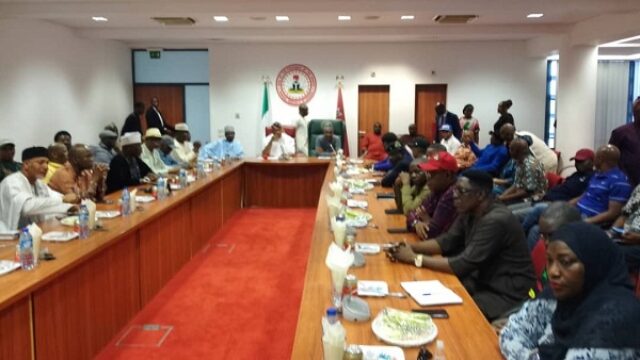
In last minute effort to prevent indefinite industrial action declared by Nigeria Labour Congress ( NLC) and affiliate bodies from tomorrow, Monday, June 3, 2024 , the leadership of the National Assembly led by the President of the Senate, Godswill Akpabio and Speaker of the House of Representatives, Hon Tajudeen Abbas, are currently in closed door meeting with the labour leaders and some Ministers at the Senate Wing of the National Assembly
The Secretary to the Government of the Federation, Senator George Akume, Minister of Finance , Wale Edun, Minister of Information and National Orientation, Alhaji Mohammed Idris Malagi and some other Ministers are also at the Emergency meeting.
Labour welcomes negotiations for “survival wage “NOT “starvation wage” for workers. Akpabio cautions Labour to be mindful of possible “collateral damage” that might lead to massive job loss
Thesewere just before they went into a closed door meeting.
The National Assembly had had earlier indicated that it would engage the organized labour as part of moves to avert the industrial action due to commence on Monday.
It said its decision of to intervene followed the deadlock between the federal government and the Labour Unions in agreeing on a new national minimum wage and reversal of the recent hike in electricity tariffs. The National Assembly stressed that both parties have tenable reasons for their respective positions.
A statement issued Sunday and jointly signed by the spokesperson of the Senate, Senator Yemi Adaramodu and the spokesperson of the House, Akin Rotimi revealed that the President of the Senate, Senator Godswill Akpabio, and Speaker of the House of Representatives, Hon. Abbas Tajudeen, are taking proactive steps to mediate and avert the impending industrial action.
The legislative arm was of the opinion that the strike action would have severe repercussions on the populace and economy
It said: “The National Assembly acknowledges the announcement by Organised Labour, including the Nigeria Labour Congress (NLC) and Trade Union Congress (TUC), to commence an indefinite strike action from Monday, June 3, 2024, nationwide.
“In view of this, the National Assembly Leadership and the Chairmen of the Senate and House Committees on Labour, Employment and Productivity respectively, Senator Diket Plang, and Rep. Adegboyega Adefarati, are looking to engage both parties in constructive dialogue and explore a variety of solutions in addressing the issues at hand.”
It added that the 10th National Assembly was committed to ensuring that the interests of all parties are fairly represented.
National
Strike is not in the interest of Nigerians, Labour Minister cautions organised labour

The Minister of State for Labour and Employment, Barr. Nkeiruka Onyejoecha, has caution the organised insisting that embarking on a nationwide strike is not in the best interest of the country and its people.
In a statement by her Special Adviser (Media) Emameh Gabriel the minister
Minister advised the workers unions to have a rethink as declaring a strike in the middle of ongoing negotiations would not only compound the economic woes but also exacerbate the suffering of millions of Nigerians who are already struggling to eke out a living from their daily endeavors.
Explaining further the Minister noted that the “government has consistently demonstrated commitment and goodwill throughout the negotiations with organised labour.
She pointed out that the government’s proposals were carefully crafted, taking into account the country’s economic realities and incorporating innovative solutions.
“These proposals include a comprehensive package featuring a wage increase to N60,000 for federal workers, the introduction of CNG-fueled buses, and enhanced financial access for Micro, Small and Medium Enterprises (MSMEs). “Additionally, the government has pledged investments in strategic sectors such as agriculture, manufacturing, education, healthcare and many others that are already in the pipeline.
She however cautioned that any new minimum wage must not lead to widespread job losses, particularly in the Organised Private Sector, which employs the bulk of the nation’s workforce
“This sector is crucial to the country’s economic growth and stability. The government’s stance is rooted in a deep understanding of the negotiations, demonstrating its dedication to finding a balance between the needs of workers and the economic realities of the country.
“The goal is to establish a minimum wage that is not only realistic but also sustainable, avoiding any potentially detrimental consequences for the economy.
“By adopting this approach, the government aims to safeguard the interests of both workers and employers, ensuring that any agreement reached is mutually beneficial and does not jeopardise the country’s economic progress.
“This balanced stance is crucial for maintaining harmony in the workforce and driving national growth”, she explained.
The Minister expressed disappointment that in a surprising turn of events, organised labour abruptly exited the negotiations yesterday, despite the government’s flexibility in rescheduling the meeting from Monday to Friday, May 31st, to accelerate the talks.
“Labour unions remained adamant in their demand for a staggering 1,547% wage increase, after the government’s proposed 100% increase, accompanied by various incentives for workers.
“It is widely acknowledged that the labour unions’ demands are unrealistic, given the country’s current economic position. The government takes into account the nation’s fiscal constraints and the need for sustainable economic growth. In contrast, labour’s demands seem disconnected from the economic realities, potentially jeopardising the very gains they seek to achieve”.
“The government’s willingness to engage in dialogue and its demonstrated flexibility in the negotiations underscore its commitment to finding a mutually beneficial solution. However, labour’s inflexibility and unrealistic expectations may hinder the progress made thus far, ultimately harming the workers they represent and the nation as a whole, the minister added.
She however, urged the unions to reconsider their decision and continue engaging in constructive dialogue to find a solution that benefits all, as strike will disproportionately harm the most vulnerable segments of our society. She concluded by asking
organised labour to continue to respect the principles of social dialogue, engaging in good-faith.
National
Gov Yusuf Visits National Security Adviser, Ribadu
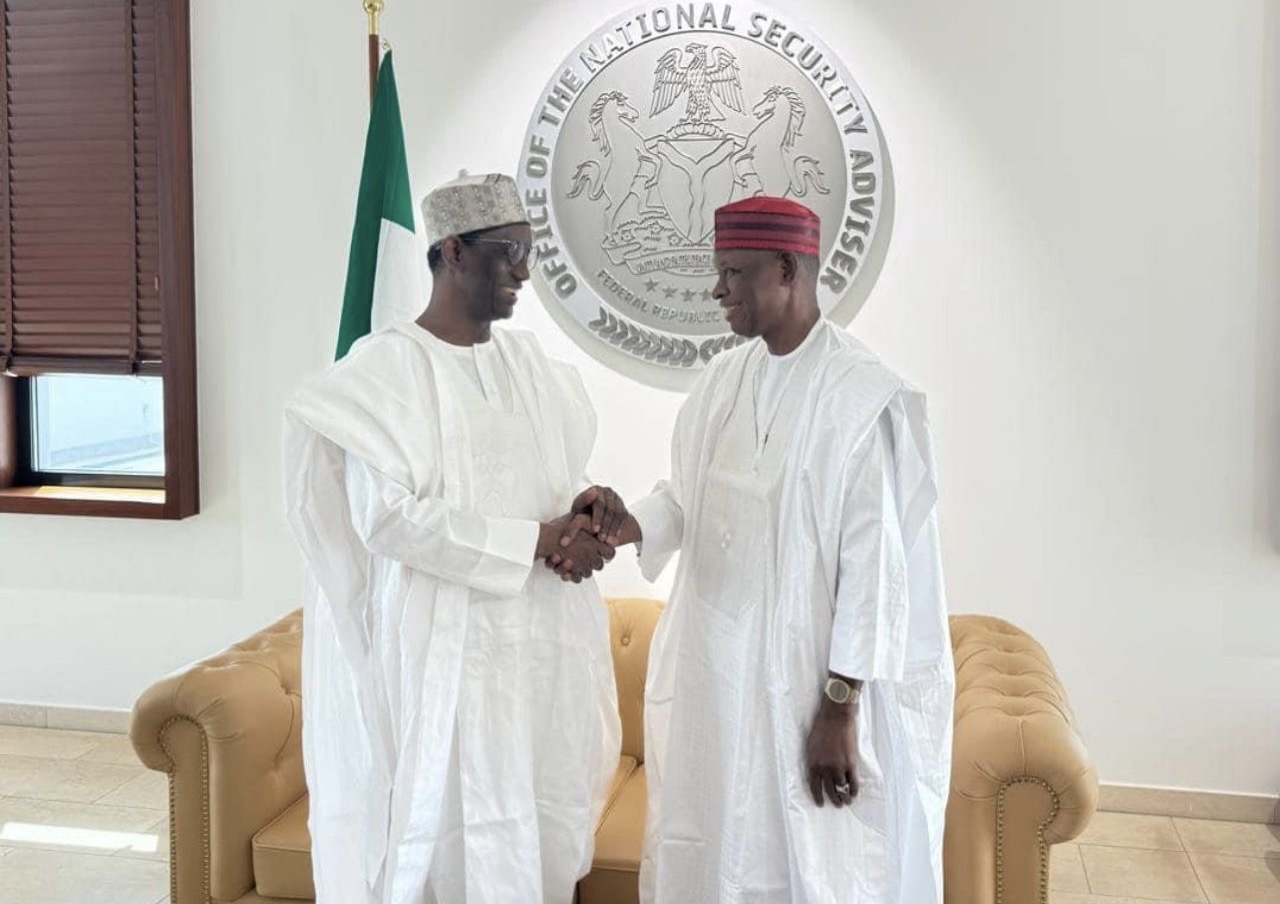
Governor Abba Kabir Yusuf of Kano State on Thursday met with the National Security Adviser Malam Nuhu Ribado at his Office in Abuja
The meeting which was ocasioned by the recent happenings in Kano following the dissolution of five emirates by the Kano State House of Assembly through the repeal of the state emirate law, the governor’s assent and the subsequent restoration of Emir Muhammad Sanusi II by the
Governor.
The Governor’s spokesperson Sanusi Bature Dawakin Tofa, in a statement indicated that the two political leaders deliberated on various matters relating to state/national development and the peaceful coexistence of the nation during their discussions in Abuja.
Recall that the NSA had been accused of involvement in the Kano crisis for allowing a substantial military presence to protect the dethroned Emir Aminu Ado Bayero, a position the Office of the NSA debunked
The Kano State Deputy Governor, Comrade Aminu Abdussalam Gwarzo, had apologized to the NSA for his implication in the Kano crises, attributing the error to flawed intelligence.
Recognizing the respected professional background and integrity of the NSA throughout his time as an Officer and Anti-corruption campaigner, the state deemed it necessary to retract the allegation and offer a sincire apology.
In harmony with these events, the Governor’s meeting with the NSA coincided with Emir of Kano Muhammadu Sanusi II’s six-day stay at the Kano palace, where a significant majority of district heads and kingmakers already pledged their allegiance and loyalty to the newly consolidated Kano Emirate under the leadership of the 16th Emir.
The state assured that Kano has been characterized by peace and tranquillity, and thus urges all residents to continue their regular activities in compliance with the rule of law.
“It was a fruitful discussion between myself and the National Security Adviser, his role is critical for the harmonious existence of our nation, so I briefed him on the recent developments in Kano,” Governor Yusuf confirmed.
-

 Crime1 year ago
Crime1 year agoPolice nabs Killer of Varsity Lecturer in Niger
-

 News1 year ago
News1 year agoFCT-IRS tells socialite Aisha Achimugu not to forget to file her annual returns
-

 Appointment2 years ago
Appointment2 years agoTinubu names El-Rufai, Tope Fasua, others in New appointments
-

 News From Kogi1 year ago
News From Kogi1 year agoINEC cancells election in 67 polling units in Ogori-Magongo in Kogi
-

 News From Kogi2 years ago
News From Kogi2 years agoEchocho Challenges Tribunal Judgment ordering rerun in 94 polling units
-

 News2 years ago
News2 years agoIPOB: Simon Ekpa gives reason for seperatists clamour for Biafra
-

 Metro1 year ago
Metro1 year ago‘Listing Simon Ekpa among wanted persons by Nigeria military is rascality, intimidation’
-

 News1 year ago
News1 year agoKingmakers of Igu/ Koton-Karfe dare Bello, urge him to reverse deposition of Ohimege-Igu

